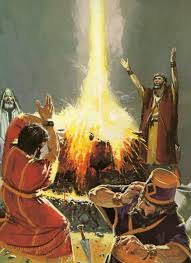|
A couple of days ago, I preached on 1 Kings 18:20-39 - the showdown between Elijah and the prophets of Baal on Mt. Carmel. (If you want to listen to or watch the message, click here and find the sermon from July 27, 2014 titled "Stuck in Neutral.") The "big idea" was that God has no equals. This passage very vividly demonstrates the unmatched greatness of Yawheh, and I developed this big idea with the following two points:
The thing is, I stopped at verse 39 - with the people falling on their knees, confessing that Yahweh is God (and, therefore, Baal is not). But that's not the end of the story. In the very next verse (1 Kings 18:40), we read the following: "Then Elijah commanded them, 'Seize the prophets of Baal. Don't let anyone get away!' They seized them, and Elijah had them brought down to the Kishon Valley and slaughtered there." This, then, leads to the very understandable question (that I've gotten from a few honest inquirers since Sunday): What's up with 1 Kings 18:40? I can imagine that some might suggest that the situation got away from Elijah. He commanded the representatives of Israel to grab the prophets of Baal (the beginning of 1 Kings 18:40), and then the Israelites took things a step too far and had the false prophets slaughtered (the end of 1 Kings 18:40). I don't think that's what's going on here, though. It doesn't seem to be what the text is saying. The larger context presents Elijah in control of things, at the command of Yahweh (cf. 18:36). All the way to the end of the chapter, Elijah is in control - even making commands that Ahab follows (18:41-42). Instead, I think the closing verses of 1 Kings 18 continue developing the big idea that "God has no equals." This verse shows very powerfully - and in a way that chafes against so many of our ingrained sensibilities - that those who defiantly and persistently rebel against the true God will be judged. So as you process 1 Kings 18:40, here are a few things to keep in mind: Baal worship was wicked and immoral.1 Kings 18:40 doesn't appear out of nowhere. Earlier in the narrative, we see how the Baal worship instituted under Ahab (1 Kings 16:29-33) is seeping into the broader culture. 1 Kings 16:34 tells us that "In Ahab's time, Hiel of Bethel rebuilt Jericho. He laid its foundations at the cost of his firstborn son Abiram, and he set up its gates at the cost of his youngest son Segub..." What this is most likely saying is that - within the culture that Ahab was creating - child sacrifice was getting a foothold. When this verse says Hiel was pursuing construction projects at the cost of his sons, that means he probably sacrificed them to try and secure some "blessing" (notice the quotes) that would advance the project and ensure its success. So Baal worship wasn't innocent. Riding on its coattails was child sacrifice (among other things). Let's not forget that as we read 1 Kings 18:40. The nation of Israel was (supposed to be) a theocracy.Very simply, "theocracy" means that God is king. The civil laws of the nation claim divine institution, and those within that nation are supposed to live by them or suffer the consequences. (I'm not advocating for a theocracy, by the way.) The nation of Israel was a theocracy - she had been delivered by Yahweh from slavery and was in covenant with Him. And just like with any human government today, traitors and subversives are taken very seriously and dealt with (often very seriously). So these prophets of Baal - these traitors and subversives in a society where Yahweh was supposed to be king - were dealt with by Elijah and the representatives of Israel.. This wasn't a random act of mob violence. This was a move towards the re-acknowledgement of Yahweh as king as subversives were dealt with. Let's not forget that as we read 1 Kings 18:40. A word or two about application:So if these are a couple of points we'd do well to factor into our interpretation of 1 Kings 18:40, how we do think about application? Are there ways these things we've seen here overlap with our lives today? First, let's make sure we're clear on how we DON'T apply this verse. We don't apply this verse with a wooden literalism. We shouldn't even think about taking any sort of half-way similar actions towards those we may define as idolaters. We don't live in a theocracy (nor - again - am I advocating for one). Instead, we live by Romans 12:9-13:7. We love. We bless. We strive to live at peace. And we leave judgment to God and our civic authorities. So how might we apply this verse? At least two ways come to mind.
What of this was most useful in helping you understand 1 Kings 18:40? What additional questions do you still have?
1 Comment
Kara
8/1/2022 08:01:10 pm
I have a question. Why didn't God allow the people to repent after their acknowledgement of the true God?
Reply
Leave a Reply. |
Tim WiebeChristian. Husband. Father. Pastor. Learner. Contributor. Reader. Categories
All
Archives
June 2024
|
© 2014-2024 | 11607 M Circle, Omaha NE, 68137 | www.thebrooksideinstitute.net


 RSS Feed
RSS Feed
